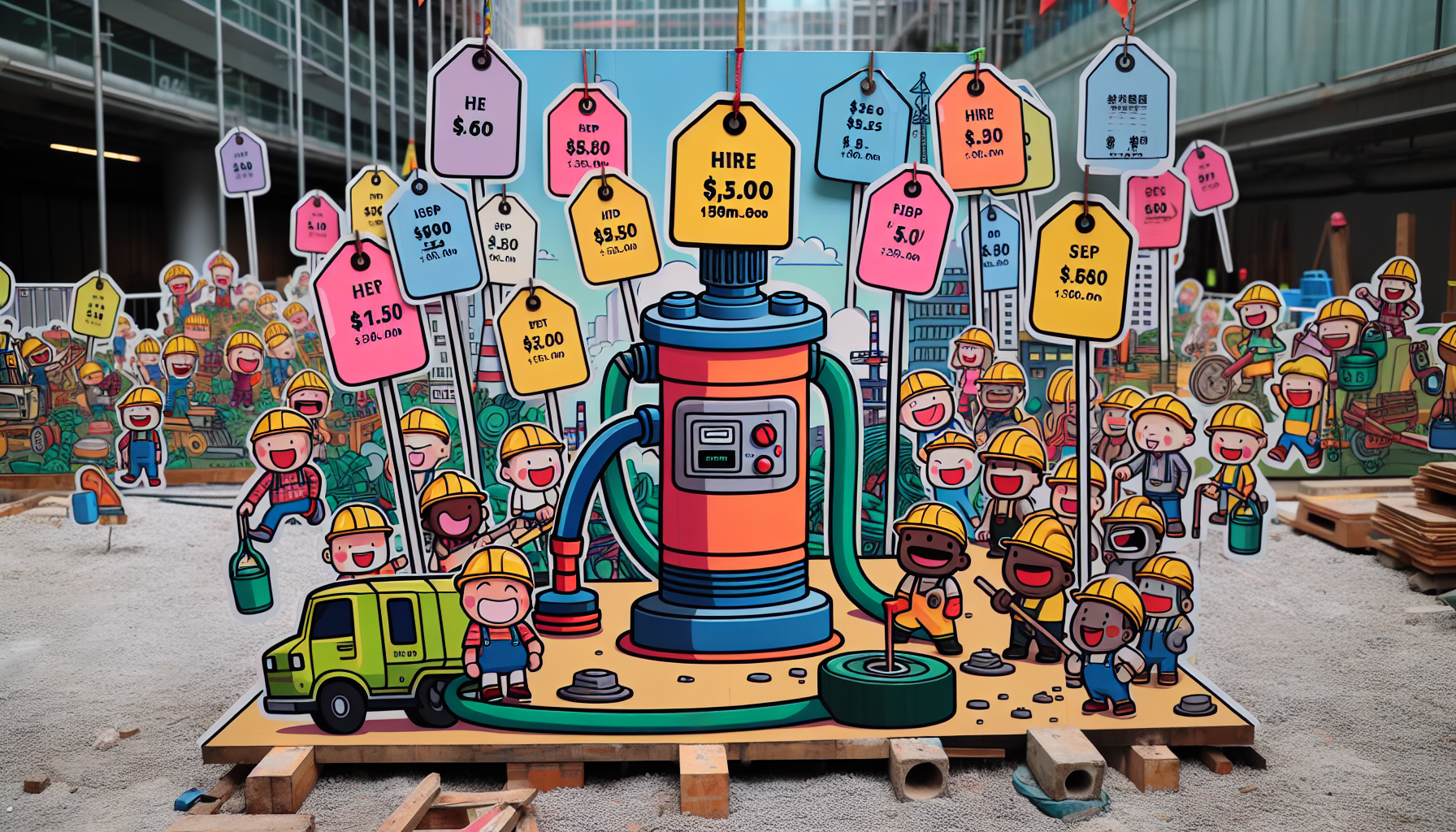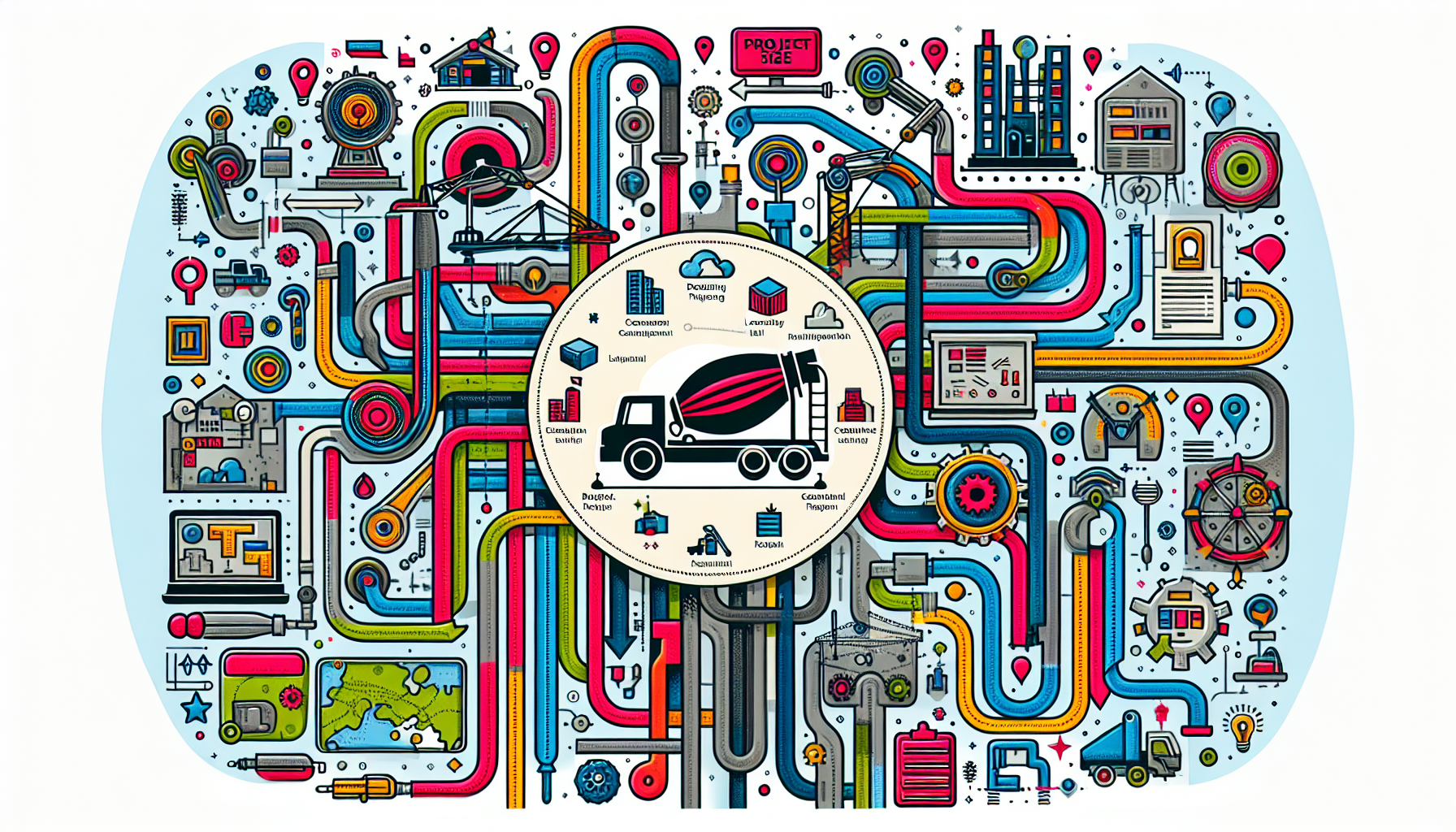-
- Oct 20
-
melbourneconcretepumping

- 0
Best Guide to Concrete Pump Hire Melbourne Cost
Looking to hire a concrete pump in Melbourne and want to know the concrete pump hire Melbourne cost upfront? This guide will provide detailed rates for both line and boom pumps, explain the factors that affect the price, and offer tips for getting the best deal. Understanding these costs can help you choose the right pump for your project and stay within your budget.
Key Takeaways
- Concrete pump hire Melbourne vary based on pump type, size, project duration, and travel expenses, necessitating careful consideration and planning.
- Line pumps are generally more cost-effective for residential projects, while boom pumps are more suitable for larger commercial projects due to their efficiency and capacity.
- Thorough market research and negotiation strategies can significantly reduce overall costs for concrete pump hire, especially when comparing quotes and assessing project-specific needs.
Understanding Concrete Pump Hire Costs

Concrete pump hire in Melbourne encompasses a range of options, primarily divided between line pumps and boom pumps. The cost of hiring these pumps can vary significantly based on several factors. The type of pump, size, concrete type, duration of hire, and travel costs all come into play when determining the final price. These variables help make informed decisions and prevent unexpected expenses.
Concrete pumps, whether for a small residential project or a large commercial build, offer unparalleled efficiency and precision. To maximize concrete pumping services, understanding detailed cost structures is necessary. This knowledge will empower you to choose the right type of pump for your specific needs and budget.
Typical Rates for Concrete Line Pump Hire

Understanding the typical rates for concrete line pump hire in Melbourne is important. Line pumps are often preferred for their versatility and efficiency in smaller or more intricate jobs, such as residential projects or confined spaces. The cost for hiring these pumps can differ based on whether the arrangement is dry or wet hire.
Dry hire rates for trailer line pumps range from $165 to $182 plus GST per hour, while wet hire rates vary between $190 and $228 plus GST per hour.
The distinction between dry and wet hire is significant. Dry hire means you rent the pump without an operator, which can be more economical but requires you to have a qualified operator on hand. Wet hire includes an operator, which adds to the cost but ensures professional handling and potentially greater efficiency. Additional charges may also apply depending on specific requirements, which we will explore further.
Hourly Rates for Line Pumps
The hourly rates for line pumps can vary based on whether you opt for truck-mounted or trailer-mounted options. Wet hire rates for truck-mounted line pumps start at $205 and can go up to $235 plus GST per hour. On the other hand, dry hire rates for these pumps typically fall between $172 and $188 plus GST per hour. Generally, the charge for a line pump is around $200 per hour.
Some companies charge based on the volume of concrete pumped, with rates ranging from $7 to $12 per cubic meter. This can be a crucial factor for projects requiring a high volume of concrete, potentially impacting the overall cost significantly.
Additional Charges for Line Pumps
While hourly rates provide a baseline cost, additional charges can significantly impact the final expense of hiring a line pump. Surcharges for extra services like hose extensions and travel can add to the overall cost. For instance, hose extensions typically cost around $7 per meter.
Other typical additional charges include slurry charges, travel costs, pipe extensions, on-site inductions, extra personnel, and overtime charges. Considering these potential surcharges when planning your budget helps avoid unexpected financial surprises.
Typical Rates for Concrete Boom Pump Hire

Concrete boom pumps are equipped with a mechanical arm that allows for remote concrete delivery, making them ideal for large-scale projects. These pumps can deliver concrete to hard-to-reach areas efficiently, which is a significant advantage for complex construction sites. The size of the pump and the specific requirements of your project will influence the cost of hiring a boom pump.
Boom pumps come in various sizes, such as the 40m Schwing boom pump and the 50m Putzmeister boom pump, with rates varying accordingly. Typically, the hourly rates for boom pumps are higher than for line pumps due to their greater capacity and advanced capabilities.
Hourly Rates for Boom Pumps
Hourly rates for boom pumps depend significantly on the size of the pump. For instance, a 32m boom pump generally costs around $210 per hour, while a 40m boom pump is typically priced at $220 per hour. Larger pumps, such as the 43m and 49m models, have rates of approximately $240 and $280 per hour, respectively.
The scale and complexity of the project also play a role in determining the rates. Larger and more intricate projects often require bigger pumps, which can handle higher volumes of concrete and reach greater heights, thus incurring higher hire costs. While boom pumps are more expensive, they offer essential capabilities for large-scale construction projects.
Surcharges for Boom Pumps
Surcharges for boom pumps can significantly affect the overall cost of hiring concrete pumps. Typical surcharge rates range from $3 to $195, depending on the specific requirements of the project. For example, additional charges may apply if the pumping distance exceeds the maximum calculated pumping distance or if there are obstacles like power lines that need to be navigated.
Thorough planning and understanding your project’s specific needs help avoid unexpected expenses. Knowing these potential surcharges can help you budget more accurately and ensure that your project stays within financial constraints.
Factors Affecting Concrete Pump Hire Rates

Several factors influence concrete pump hire rates, so consider these when planning your project. Transport distance, type of pump, and specific surcharges can significantly impact the final hire cost. Effective planning and scheduling can minimize costs by ensuring that all resources are ready on-site and avoiding wasted time.
Understanding market trends and typical pricing for concrete pump hire in your area can also help secure favorable hire rates. Researching and comparing different service providers offers insights into what to expect and how to negotiate better terms.
Project Size and Complexity
The size and complexity of your construction project are crucial factors in determining the appropriate type of concrete pump and the associated costs. Larger projects typically favor boom pumps for their efficiency and ability to handle higher volumes of concrete. Commercial projects, in particular, involve higher operational costs due to the greater capacity and complexity of logistical challenges.
In residential projects, site access and smaller project requirements significantly influence costs. Evaluating the specific needs of your project, including the volume of concrete and required pumping rate, helps choose the right pump and avoid unnecessary expenses.
Location and Travel Costs
Location and travel costs significantly affect the overall cost of concrete pump hire. Urban locations generally have lower travel costs compared to remote or rural areas, which incur higher expenses due to the distance and time required for transport. Travel costs for line pump hire can range from $150 to $165 plus GST per hour, significantly affecting total expenses.
Extended hire durations may also result in additional charges for transport or setup, further increasing overall costs. Consider these factors when budgeting to account for all potential travel-related expenses.
Duration of Hire
The duration of hire directly influences the total cost of concrete pump hire. Longer hire periods typically lead to greater expenses, but they can also offer opportunities for cost savings through negotiated discounts. Penalty rates for boom pump hire can increase charges significantly, with an additional $60 per hour applicable for post-hours and weekend work.
Negotiating hire terms can lead to significant cost reductions, including discounts for longer rental durations and better terms for delivery fees, wait times, and additional services. Effective negotiation helps manage the overall budget and keeps the project within financial constraints.
How to Get Competitive Rates for Concrete Pump Hire

Securing competitive rates for concrete pump hire requires thorough market research and comparing multiple service providers. Obtaining various quotes helps you understand market rates and identify the best deals available. This proactive approach can lead to significant cost savings and ensure the best value for your money.
Negotiating hire terms can further reduce costs. Longer rental periods and bulk pricing arrangements can lead to lower hourly rates, making it essential to explore all available options and negotiate effectively.
Comparing Quotes
Obtaining multiple quotes is crucial for securing the best rates for concrete pump hire. Comparing prices and services from different providers helps identify the most competitive offers and make informed hiring decisions. This process helps you understand the price range and value provided by different companies, ensuring the best deal.
Gathering multiple quotes allows you to compare the level of service offered, ensuring the provider meets your exact needs and expectations. This comprehensive approach helps avoid potential pitfalls and secure the most efficient and cost-effective solution for your project.
Negotiating Terms
Effective negotiation can lead to significant cost reductions in concrete pump hire. Longer rental periods often result in discounted rates, making it beneficial to negotiate for extended hire durations. This strategy can help you achieve bulk pricing arrangements and lower the overall cost of hire.
Beyond price, discussing terms like delivery fees, wait times, and additional services helps secure the best possible deal. By being proactive and negotiating effectively, you can manage your budget more efficiently and ensure a successful project outcome.
Residential vs. Commercial Concrete Pump Hire
Costs and requirements for residential and commercial concrete pump hire vary significantly. Commercial projects typically involve more complex requirements and higher overall costs due to the scale of the project, equipment needs, and technical challenges. In contrast, residential projects generally incur lower costs due to simpler requirements.
Understanding these differences helps choose the right type of pump and manage the budget effectively. Considering the specific needs of your project helps make informed decisions and avoid unnecessary expenses.
Residential Projects
In residential projects, hiring a line pump is often more economical than other concrete transfer methods, making it ideal for smaller construction projects. Access challenges in residential areas can lead to higher costs, particularly if long hose runs or specialized equipment are necessary.
Line pumps are useful for smaller projects close to the ground, such as sidewalks and swimming pools. These pumps offer the precision and efficiency needed for residential projects while managing costs.
Commercial Projects
Commercial concrete projects are generally larger and more technically challenging. These projects often require larger, more complex equipment, such as boom pumps, to handle higher volumes of concrete and reach greater heights.
The increased complexity and scale of commercial projects result in higher costs. The efficiency and capabilities of boom pumps make them indispensable for large-scale construction, ensuring concrete delivery meets project demands.
Choosing the Right Concrete Pump for Your Project
Choosing the appropriate concrete pump for your project is crucial for balancing your budget and meeting requirements. The type of pump you select can significantly influence hire rates; line pumps typically cost less than boom pumps. Factors such as project size, complexity, and specific site requirements play a key role in this decision.
Thoroughly assessing your project’s needs and safety requirements ensures the selection of the most suitable pump. This helps manage costs and enhances project efficiency and success.
Line Pumps vs. Boom Pumps
Residential concrete pumping jobs often use line pumps due to their affordability and suitability for smaller sites. Line pumps are effective for projects requiring precise concrete placement in confined spaces, such as residential driveways and footpaths. For projects requiring maneuverability and cost efficiency, line pumps are an ideal choice.
In contrast, commercial construction often requires boom pumps as they can reach higher elevations and handle larger volumes of concrete. These pumps are advantageous for projects with complex logistical challenges, like high-rise buildings or expansive commercial sites. Understanding the distinct advantages of both pump types helps make an informed choice based on your project’s scale and complexity.
Assessing Project Needs
Assessing your project’s unique requirements is crucial to avoid unnecessary costs when hiring a concrete pump. Key factors that influence concrete pump hire rates include the type of pump needed, the size and complexity of the project, and the duration of the hire. Evaluating these elements helps choose the right pump and optimize both cost and efficiency for your specific project needs.
Location plays a significant role in determining costs. Travel costs can increase if the job site is remote or difficult to access. Consider all factors, including project scale, complexity, and location, to ensure you select the most suitable and cost-effective concrete pump for your project.
Summary
Understanding the costs associated with concrete pump hire is essential for managing your construction budget effectively. By considering factors such as pump type, project size, location, and duration of hire, you can make informed decisions that help you save money and ensure the success of your project. Comparing quotes and negotiating terms are practical strategies that can lead to competitive rates and better overall value.
Whether you are working on a residential or commercial project, choosing the right concrete pump is crucial for efficiency and cost management. By assessing your project needs and understanding the various costs involved, you can make smart choices that align with your budget and project requirements. With the right knowledge and planning, you can achieve a successful outcome for your next concrete pumping project.
Frequently Asked Questions
What factors influence concrete pump hire rates?
Concrete pump hire rates are primarily influenced by the type and size of the pump, the type of concrete being used, the duration of the hire, and associated travel costs. Understanding these factors will help you make a more informed and cost-effective decision.
What are the typical hourly rates for concrete line pumps?
The typical hourly rates for concrete line pumps range from $205 to $235 plus GST for wet hire, and $172 to $188 plus GST for dry hire. It is essential to consider these rates when planning your project budget.
What additional charges should I expect when hiring a concrete pump?
When hiring a concrete pump, you should anticipate extra charges for hose extensions, travel costs, slurry fees, on-site inductions, additional personnel, and possible overtime. It is advisable to clarify these potential costs upfront to avoid surprises.
How can I get competitive rates for concrete pump hire?
To secure competitive rates for concrete pump hire, conduct thorough market research, request multiple quotes, and negotiate terms, such as longer rental periods for possible discounts.
What is the difference between line pumps and boom pumps?
The key difference is that line pumps are cost-effective and better for smaller, accessible projects, whereas boom pumps are intended for larger, complex tasks that demand high-volume concrete delivery and elevation reach.
melbourneconcretepumping